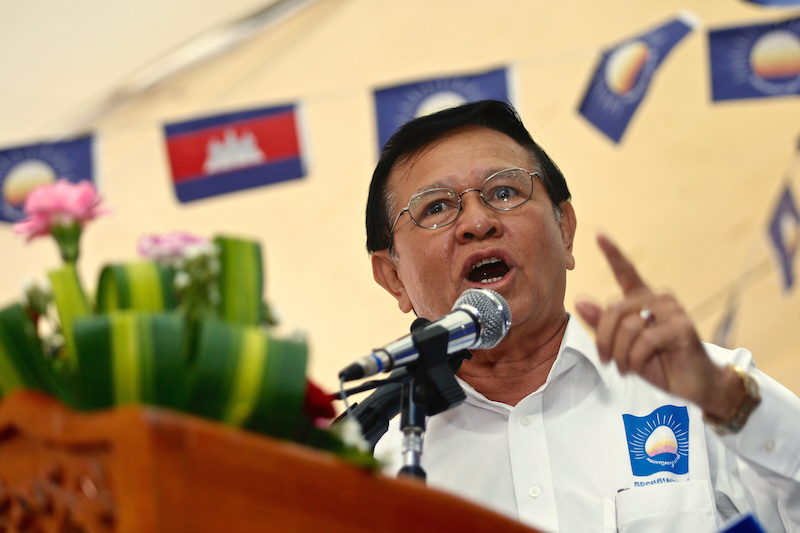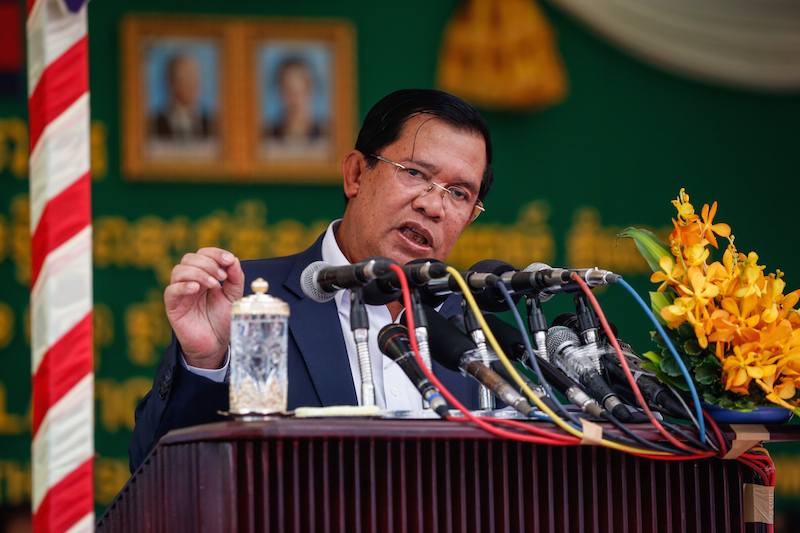The country’s largest opposition party—and the only serious challenge to Prime Minister Hun Sen’s grip on power—doesn’t know what to do next.
As many of Cambodia’s independent and opposition-aligned media outlets have been pressured or shuttered in recent weeks following an aggressive and widely condemned government crackdown, the CNRP has stayed relatively quiet, limiting itself to a few Facebook posts and the occasional news release.

The party is hoping that its low profile will buy one thing: survival.
Asked how the party might respond to the recent crackdown, CNRP lawmaker Son Chhay said on Monday, “We really do not know, at the moment, what to do.”
“We don’t want to be seen as the party that allows the ruling party to silence us,” he said.
But the party is hamstrung by widely criticized amendments to the Law on Political Parties passed last month that give the government and courts unprecedented powers to suspend and abolish entire political parties, he said.
“To keep the party alive until the election is the main objective for the party right now,” Mr. Chhay said.
While urging voters to register for next year’s national election in a video posted to Facebook, CNRP President Kem Sokha also said the opposition has one goal—to reach next year’s elections.
Much like the way the Law on Associations and Non-Governmental Organizations has been used in recent months to pressure NGOs—first to investigate the election-monitoring consortium known as the Situation Room, and again last week to shut down the U.S.-funded democracy NGO National Democratic Institute—the new political parties law appears to be hitting its intended target hard.
The government’s most recent crackdown on media outlets has drawn condemnation from the U.S., E.U, U.N. and numerous rights groups, and has sparked widespread and largely negative international media coverage. But even as Cambodia’s donors flashed rare signs of unease at the government’s moves, the opposition has shied away from more vocal criticisms or direct action seen in the past.

The CNRP’s low profile, even as the country’s democratic trappings are chipped away, is an understandable intentional strategy, according to political analyst and author Sebastian Strangio.
“With Hun Sen in the mood that he is right now, it probably doesn’t make sense to inflame his anger by calling for protests or taking a stronger line on the current crackdown,” Mr. Strangio said.
The party was likely seeking to avoid trouble and then win big in next year’s election, he said, in the hope the result would either fracture the CPP or push the international community to pressure Mr. Hun Sen to step down.
“But in order for this to work [and for what it’s worth I think the odds are long] the party has to survive to contest the poll,” he said.
After the last national election in 2013, the CNRP engaged in a yearlong protest movement over alleged voter fraud that involved marches and the occupation of a central Phnom Penh park, resulting in concessions wrung from the ruling party. But it also saw four protesters fatally shot by military police officers, and some of the political concessions evaporated in the following years.
The CNRP’s monthslong absence from the National Assembly last year to protest a court case brought against then-deputy party leader Kem Sokha did not provide the results the party sought.
Since then, statements and Facebook posts have replaced direct action or popular mobilization. One of the opposition’s vice-presidents, Mu Sochua, decried the government’s recent targeting of radio stations that broadcasted opposition-aligned programming, U.S.-funded media outlets such as Radio Free Asia and Voice of America, and independent newspapers like The Cambodia Daily.
“The point is independence of the media is one of the prerequisites of free and fair elections,” Ms. Sochua wrote in an email, a point also echoed by Mr. Chhay.
But asked whether the government’s recent threats to that “requisite” media would prompt additional action from the party, Ms. Sochua demurred.
“The people will decide. We will refer the question to them,” she wrote, adding, “When we must act is strategic.”
As the CNRP continues to look on while many of the media outlets not aligned with or owned by the ruling party are shuttered or threatened, it increasingly appears that the strategic time to act may only arrive if and when the party itself faces elimination.
“It might be a mistake, but the alternative is also fraught with risk,” Mr. Strangio said. “Hun Sen has them right where he wants them.”



